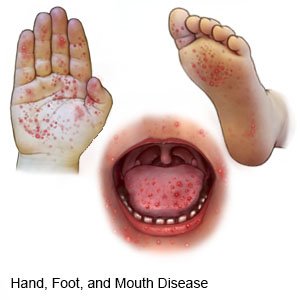Hand, Foot, and Mouth Disease
Medically reviewed by Drugs.com. Last updated on Aug 4, 2025.
Hand, foot, and mouth disease (HFMD) is an infection caused by a virus. HFMD is easily spread from person to person through direct contact. Anyone can get HFMD, but it is most common in children younger than 5 years.
 |
DISCHARGE INSTRUCTIONS:
Return to the emergency department if:
- You have trouble breathing, are breathing very fast, or you cough up pink, foamy spit.
- You have a high fever and your heart is beating much faster than it usually does.
- You have a severe headache, stiff neck, and back pain.
- You become confused and sleepy.
- You have trouble moving, or cannot move part of your body.
- You urinate less than normal or not at all.
Call your doctor if:
- Your mouth or throat are so sore you cannot eat or drink.
- Your fever, sore throat, mouth sores, or rash do not go away after 10 days.
- You have questions or concerns about your condition or care.
Medicines:
You may need any of the following:
- Acetaminophen decreases pain and fever. It is available without a doctor's order. Ask how much to take and how often to take it. Follow directions. Read the labels of all other medicines you are using to see if they also contain acetaminophen, or ask your doctor or pharmacist. Acetaminophen can cause liver damage if not taken correctly.
- NSAIDs , such as ibuprofen, help decrease swelling, pain, and fever. This medicine is available with or without a doctor's order. NSAIDs can cause stomach bleeding or kidney problems in certain people. If you take blood thinner medicine, always ask if NSAIDs are safe for you. Always read the medicine label and follow directions. Do not give these medicines to children younger than 6 months without direction from a healthcare provider.
- Take your medicine as directed. Contact your healthcare provider if you think your medicine is not helping or if you have side effects. Tell your provider if you are allergic to any medicine. Keep a list of the medicines, vitamins, and herbs you take. Include the amounts, and when and why you take them. Bring the list or the pill bottles to follow-up visits. Carry your medicine list with you in case of an emergency.
Drink extra liquids, as directed:
Liquid will hep prevent dehydration. Ask your healthcare provider how much liquid to drink each day, and which liquids are best for you.
Have foods and liquids that are easy to swallow:
Examples include cold foods such as popsicles, smoothies, or ice cream. Do not have sodas, hot drinks, or acidic foods such as tomato sauce or orange juice.
Prevent the spread of HFMD:
You can spread the virus for weeks after your symptoms have gone away. The following can help prevent the spread of HFMD:
- Wash your hands often. Use soap and water. Wash your hands after you use the bathroom, change a child's diapers, or sneeze. Wash your hands before you prepare or eat food.

- Stay home from work or school while you have a fever or open blisters. Do not kiss, hug, or share food or drinks.
- Wash all items and surfaces with diluted bleach. This includes toys, tables, counter tops, and door knobs.
Follow up with your doctor as directed:
Write down your questions so you remember to ask them during your visits.
© Copyright Merative 2025 Information is for End User's use only and may not be sold, redistributed or otherwise used for commercial purposes.
The above information is an educational aid only. It is not intended as medical advice for individual conditions or treatments. Talk to your doctor, nurse or pharmacist before following any medical regimen to see if it is safe and effective for you.
Learn more about Hand, Foot, and Mouth Disease
Treatment options
Care guides
Further information
Always consult your healthcare provider to ensure the information displayed on this page applies to your personal circumstances.
